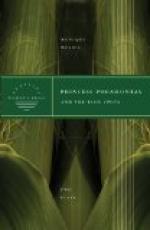Plainly Powhatan, too, was at a loss to know what to do with it. The next gifts, a basin and ewer, met with more enthusiasm. The squaws were particularly interested in them when Pocahontas told them that they were made of a substance which would not break as did their own vessels of sun-baked pottery. But it was the red mantle of soft English cloth, in shape like to the one, he was told. King James had worn at his coronation at Westminster, that made Powhatan’s grim features relax a little with pleasure. Captain Newport placed it on the werowance’s shoulders and held a mirror that he might behold himself thus handsomely apparelled.
Then they proceeded to the crowning. Newport would have liked to have some words of ritual read, even though the principal of the ceremony had not been able to understand them; but the chaplain pointed out that neither the law nor the Prayer-Book made any provision for the crowning of a heathen, and that after all it was the act, not the words, which would impress the savages.
The drummer beat a loud tattoo and the trumpeter blew a call that startled the squaws and the children into shrieks; the braves were quicker in hiding their astonishment. Then Smith and Newport walked forward, Newport holding the crown. Smith said:
“Kneel, Wahunsunakuk, that we may crown thee.”
But Powhatan, whose understanding of these strange proceedings was not clear, though he comprehended Smith’s words, continued to stand stiff and straight as a pine tree.
“Kneel down, oh, Powhatan,” urged Smith. “Mistake not, this act is a kingly one; so do all the kings of Europe.”
But Powhatan would not. To him the posture was one unfitting to the dignity of a mighty werowance, ruler over thirty tribes and lord of sixty villages. He would accept presents sent him, and he had no objection to wearing a glittering ring upon his head if the white men chose to give him one; but he would not kneel; that was going too far in his acquiescence to strange ways. Such a position was for suppliants and squaws and children.
Smith was uncertain what to do. The officers of the Colony in London had laid great stress upon a proper crowning, believing, as he did not, that it would impress the Indians as the symbol of an alliance between their people and the English. He thought a moment, then whispered a word to Newport. The two quickly laid their hands on Powhatan’s shoulders and pressed down gently but firmly, a pressure which bowed his knees slightly. Then, before he had time to recover himself, Newport had placed the crown upon his grizzled head.
According to orders, two soldiers, seeing that the ceremony was accomplished, fired a salute with their muskets. Powhatan started suddenly; Nautauquas raised his head like a deer scenting danger, and some of the braves started to run towards the knot of white men. But the calm demeanor of Smith showed them their error.




